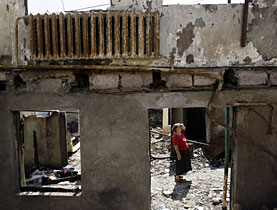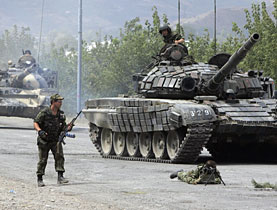Swiss calls for more security in Georgia

The United Nation's representative on the rights of internally displaced people has denounced the ongoing violence in the buffer zone below South Ossetia.
Swiss law professor Walter Kälin, who has just returned from a four-day trip to Georgia, told swissinfo that while he was “cautiously optimistic” about people returning home, the ongoing militia violence and looting in the buffer zones were “inacceptable”.
On Monday Russian forces stepped up preparations to withdraw from bases and checkpoints surrounding two separatist regions in Georgia, four days ahead of a deadline closely watched by the West.
Moscow must pull back thousands of troops from buffer zones surrounding South Ossetia and Abkhazia by Friday under the terms of a deal brokered by French President Nicolas Sarkozy. Russia left troops in the areas after they routed Georgian forces during an August war.
On Friday the Swiss foreign ministry announced Switzerland would represent Russia’s diplomatic interests in Georgia.
swissinfo: You have recently travelled into the buffer zone below South Ossetia and spoken with Georgian ministers, UN colleagues and displaced people. What is your reaction?
Walter Kälin: There are three groups of displaced people with different problems and needs. There are 25,000-30,000 newly displaced people from South Ossetia proper and the Kodori Gorge in northern Abkhazia who are unlikely to be able to return in the near future. The government has started to build new houses for them.
There are those from the buffer zone who should be able to return if the Russians withdraw their troops either before winter or in spring – it depends whether their homes have been destroyed or looted. And then there are the 220,000 who have been displaced for 15-16 years, going back to the conflict in Abkhazia in the early 1990s, many of whom are still lingering in collective shelters.
I very much welcome the fact that the Georgian government tries to avoid past mistakes and provide the newly displaced with a durable solution, either by helping them to return if this is possible or by integrating them in their new surroundings. The challenge, however, remains to help those displaced in the early 1990s to finally start normal lives again.
swissinfo: Is emergency humanitarian aid needed?
W.K.: No. In the initial phase there were some problems but overall I think the international community and the government have managed the situation very well.
People are in collective shelters – and that’s never an ideal situation – but compared with other situations I really felt that the immediate humanitarian needs are largely met. People didn’t have health problems, everyone was getting food and so on.
The challenge now is to get them through the winter – we need some investment to winterise some of these locations. The IDPs [internally displaced persons] I spoke to didn’t complain about the aid they got – their main concern was what was going to happen to them in the future.
swissinfo: Will some refugees flee to Europe?
W.K.: Not if the government manages to return these people to safe conditions or integrate them and provide them with livelihoods.
swissinfo: There have been several violent incidents near the line separating Georgian and Abkhazian-controlled territory since the ceasefire. Will these calm down or will a tit-for-tat cycle develop?
W.K.: It’s very difficult to say. The situation is very volatile, but the announcement by Russia that it will withdraw its troops plus the arrival of the EU monitoring mission are good signals. But things can change very quickly. Serious efforts are needed to stabilise the situation in the buffer zone where these incidents have been happening.
swissinfo: What are the biggest challenges to a peaceful resolution?
W.K.: There is a ceasefire and there is no fighting right now in terms of military activity. In that sense the ceasefire have been very effective.
But what’s going on in the buffer zone is that people come in who loot and harass the local population. These are not formal armies, but maybe criminal elements, maybe militias. This is unacceptable and must stop immediately. So the challenge is restoring law and order, not so much of restoring peace. Security is an essential condition in order for people to return.
As regards the peaceful resolution of the conflict, a political process is needed that will take a long time, and it’s too early to tell what the outcome will be.
swissinfo-interview: Thomas Stephens
Walter Kälin is a professor of constitutional and international public law at Bern University.
He was asked by the Swiss government in 2003 to prepare a study on reforming the Human Rights Commission. His paper formed the basis for the new council.
In 1991-1992 he was the UN’s special rapporteur on human rights in Iraqi-occupied Kuwait.
Since 2003 he has been a member of the UN Human Rights Committee.
In 2004 he was appointed as former UN Secretary-General Kofi Annan’s representative on the human rights of internally displaced persons.
The pro-Moscow enclave of South Ossetia in the Caucasus broke from Georgia as the Soviet Union split apart in the 1990s, but has no international status.
Georgia began a new offensive to regain control over South Ossetia on August 7, launching heavy rocket and artillery fire and air strikes.
In response, Russia, which has granted passports to most South Ossetians, launched overwhelming artillery shelling and air attacks on Georgian troops.
A preliminary ceasefire was signed on 12 August 2008, although fighting did not stop immediately.
Russia recognised the independence of both South Ossetia and Abkhazia after the fighting.

In compliance with the JTI standards
More: SWI swissinfo.ch certified by the Journalism Trust Initiative




You can find an overview of ongoing debates with our journalists here. Please join us!
If you want to start a conversation about a topic raised in this article or want to report factual errors, email us at english@swissinfo.ch.